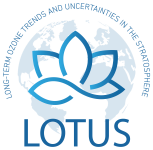Speaker
Dr
William Ball
(PMOD/WRC Davos & IAC/ETH Zurich)
Description
DLM has been postulated to be an improvement on standard multiple linear regression (MLR) approaches to timeseries analysis, but it is relatively new and seldom implemented. Among other things, it has three significant advantages over MLR: (i) for trend estimation, no a priori assumption is made about the linear nature of trends, nor when the recovery inflection date in ozone timeseries, typically fixed between 1998 and 2000, should occur; (ii) the shape and magnitude of seasonal cycle is allowed to slowly vary over time, something that is difficult to account for in standard preparation procedures for MLR analysis, but may nevertheless lead to bias in trend estimates; and (iii) uncertainties are treated in a rigorous manner, uncertainties on proxies can easily be included, and there is no requirement for orthogonality of proxies.
Here, we present a new DLM algorithm that is faster than previous versions, and is able to run on a laptop. The code is in python format and will be provided with a clear jupyter notebook tutorial to allow anyone to start implementing DLM on timeseries. We will give an online, working example of this code, show the diagnostic tools that will be available within the python package, and demonstrate visually the benefits of DLM.
Primary author
Dr
Justin Alsing
(Flatiron Institute)
Co-author
Dr
William Ball
(PMOD/WRC Davos & IAC/ETH Zurich)

